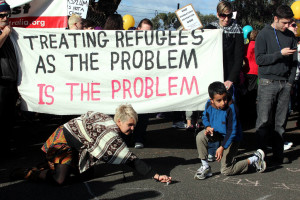
All those who have been heartened by the outpouring of goodwill and solidarity shown by the public towards refugees in recent weeks – which stands in stark contrast to the xenophobic rhetoric that’s become commonplace in media and politics – will be asking themselves ‘can it last?’
I think it is possible, if workers rights are at the heart of our approach towards refugees and asylum seekers as well as migrants.
This week European Commissioner Jean-Claude Juncker delivered his State of the Union speech in which made several key commitments to tackling the refugee crisis. These included asking member states to relocate 120,000 refugees from Italy, Greece and Hungary; to reassess the Dublin system that requires that asylum applications be dealt with by the first country of entry and opening more legal channels for migration.
This supports a number of the calls made in a letter to the Prime Minister signed by the TUC General Secretary and 350 other leading figures last weekend.
This letter regretted that the UK government had taken so few refugees that urgently need protection. Cameron has indicated Britain may only take in 4,000 refugees from Syria this year, this compares poorly to the response of other countries, particularly Germany that has indicated it could take 500,000 refugees a year.
One of his most important parts of Juncker’s speech for trade unions was his statement:
‘I am strongly in favour of allowing asylum seekers to work and earn their own money whilst their applications are being processed.’
ETUC General Secretary Bernadette Ségol welcomed this commitment, saying this week:
“Trade unions agree with President Juncker that asylum seekers should be allowed to work. Governments, employers and trade unions would have to make sure that refugees are not exploited by unscrupulous employers to drive down wages or working conditions. Trade unions are on the frontline of integrating refugees into the workplace.”
Currently asylum seekers (those seeking refugee status) do not have the right to work in the UK. This is in contrast to Germany where asylum seekers are allowed to work after three months.
The TUC believes those seeking asylum, and those whose asylum application has been refused, as well as refugees, should all have the right to work.
We emphasised this in our submission to the Home Office consultation on proposals to remove support for failed asylum seekers and their children. We are opposed to these proposals because removing support from failed asylum seekers will increase destitution and child poverty.
As well as continuing support to failed asylum seekers, we believe the government should allow asylum seekers and failed asylum seekers to work legally. This would allow to support themselves and escape the terrible poverty of a life living on benefits alone – recent cuts mean an asylum seeker single parent with a child receives just £73 a week.
Allowing asylum seekers to work of course also allows them to contribute legally to the economy and the country’s taxes which pay for our hospitals and schools.
Those granted refugee status in the UK do have permission to work. However they are still vulnerable to exploitation, such as being made to work in dangerous conditions or being paid under the minimum wage, as many bad employers will never be checked by inspectors.
The Migration Advisory Committee noted in a report last year that, on average, an employer can expect to be visited by HMRC inspectors every 250 years to check if they are paying the minimum wage. This is partly a result of the government stripping enforcement agencies like HMRC and the Gangmasters Licensing Authority of power and resources.
Workers from other countries are also vulnerable to exploitation as they lack awareness of their rights at work or how to join a trade union. This means too many bad employers get away with using refugees and migrant workers to undercut local workers.
The TUC believes the government should work with trade unions and agencies that enforce employment rights in order to make sure refugees, asylum seekers and migrant workers know their rights – we hope our guide to workers’ rights in 13 languages (with more on the way) can help.
This call is echoed by unions across Europe, such as Germany’s largest trade union IG Metall.
The trade union movement in Britain has a long history of solidarity and standing up against discrimination. We know that when employers are allowed to divide workers, everyone loses out.
It is sadly predictable that we are already seeing a return in parts of the press and politics to rhetoric that scapegoats refugees, asylum seekers and migrants for problems local workers face around low pay and precarious jobs.
In order to sustain the tremendous humanitarian solidarity the public has shown recently towards refugees we need to connect it with solidarity in the workplace, and union campaigns to establish a floor level of rights and decent jobs for everyone.
source

More Stories
Navalny’s death used to hide western failures in Ukraine and their support for Israel’s genocide
Gifts from Gaza
Vulture capital circles over the corpse of Ukraine…